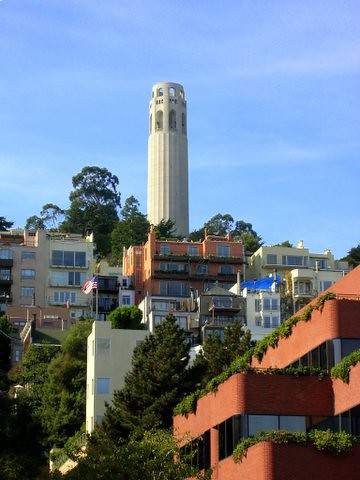Friday, April 10, 2009
Bronstein takes the fall : Newspaper disaster? It's all my fault. I'm the one.
Bronstein at Large : Newspaper disaster? It's all my fault. I'm the one.
This column is from last month, but I hadn't noticed it until I saw Bronstein link to it from today's piece.
He has some interesting ideas, including this one:
In the meantime, we should look at the problem in simpler terms:
I get two newspapers delivered at home: The Chronicle and the New York Times. The Times hits the step somewhere between 4 and 5 a.m. The Chronicle gets there before 6. Both papers are in existential trouble despite good work and 300 years of accumulated history between them.
So even in the face of the threats to our survival, there are still at least two different people and two entirely different delivery systems in place to get two newspapers to the same address in the same couple of hours. Really? In what rational world does that make sense? Why is that a good idea for businesses on the brink?
He goes on to talk about sharing resources beyond the delivery staff and the printing presses. Pooled news?
We already have pooled news. Take a look at the Chronicle some time and check out how much of the news is fed in from AP or the NYT. (How often do I read an article and think, I read that a day or two ago. Yup, another article from NYT.) We also have the end-of-the-week roundup column telling us what was in the Economist and the half page that covers what the top stories were in a handful of top international papers. We have blocks of print nipped from people commenting on sfgate.com. We have the columnists, writers and editorial and ... but for how much longer? (No more Morford except on sfgate.com, alas.)
Who knows what's to come. The dominant paradigm is failing. We are watching it failing, and blaming the failure on Craig Newmark or Google is not saving the bacon. What needs to change? What will change? What will take the place of the bagged up newspaper delivered to the doorstep?
Bronstein makes mention of both San Francisco Appeal and The Public Press, recently added online news sources for those who don't insist that they get ink smudges on their fingers.
Is that what the future will be? Smaller, more focused local papers? Online "papers"? Behemoth news providers feeding news to newspapers that don't have much staff anymore?
Maybe some brill soul will work out a nice arrangement with Google, which will monetize their news aggregator up the wazoo and then employ their brilliant data mining to figure out how to share the ad $$ equitably with the papers that people are clicking through to.
Will the papers then put their staff on a revised salary plan and "share" their clickthrough income with the staffers who write the articles that people want to read? If I click through to Carl Nolte or Mark Morford (both of whom I enjoy) but not Willie Brown, will Carl and Mark get bigger slices of the pie?
*
But enough of that, here are my dull and unimaginative suggestions to the Chronicle for generating revenue.
(1) Take the crossword answers and the Sudoku answers out of the same-day newspaper. If someone wants hints and clues and answers THAT DAY, they can log on and pay ($1 -- the cost of a Lotto ticket -- would be a good price point) for the info.
(2) Sudoku? Monetize that. Someone inks in that day's Sudoku, ships their answers to the Chronicle with a ($1 again) fee. All the fees go into a pot. One person's name is drawn. If that person's answers are all correctomundo, that person gets 25% of the pot. There'll be a bit of expense over at the Chronicle for handling the entries, but how much could that be? The rest would be found money. Note: you'll have to buy (or otherwise arrange to read) a physical paper to find out how to contact the paper to send in that day's entry.
(3) Be more upfront about what ads cost. Make the information more available. Anniversary, Birthday, Graduation coming up? Maybe the Chronicle could put messages on Page One or above the fold for the Sports section or next to the comics for a suitable price.
(4) Someone had suggested a poet's corner where someone's poetry would be published, for a price. (And then the year's worth of poet's corners could be gathered into a book and offered for sale to those interested.) Why not?
(5) Have a photographer's corner too.
Oh, and while I have you on the horn, could you PLEASE PLEASE PLEASE move Paul Madonna's work out of The Pink? Paul Madonna needs to be on a white background, and last Sunday? The print job was so uneven, I couldn't even read the print that accompanied his work. Don't let that happen again.
Update: An edited (to meet the 200 wd cutoff) version of my suggestion list was published in the Chronicle's LtoE column on April 16. (See 4th letter in. ...)
This column is from last month, but I hadn't noticed it until I saw Bronstein link to it from today's piece.
He has some interesting ideas, including this one:
In the meantime, we should look at the problem in simpler terms:
I get two newspapers delivered at home: The Chronicle and the New York Times. The Times hits the step somewhere between 4 and 5 a.m. The Chronicle gets there before 6. Both papers are in existential trouble despite good work and 300 years of accumulated history between them.
So even in the face of the threats to our survival, there are still at least two different people and two entirely different delivery systems in place to get two newspapers to the same address in the same couple of hours. Really? In what rational world does that make sense? Why is that a good idea for businesses on the brink?
He goes on to talk about sharing resources beyond the delivery staff and the printing presses. Pooled news?
We already have pooled news. Take a look at the Chronicle some time and check out how much of the news is fed in from AP or the NYT. (How often do I read an article and think, I read that a day or two ago. Yup, another article from NYT.) We also have the end-of-the-week roundup column telling us what was in the Economist and the half page that covers what the top stories were in a handful of top international papers. We have blocks of print nipped from people commenting on sfgate.com. We have the columnists, writers and editorial and ... but for how much longer? (No more Morford except on sfgate.com, alas.)
Who knows what's to come. The dominant paradigm is failing. We are watching it failing, and blaming the failure on Craig Newmark or Google is not saving the bacon. What needs to change? What will change? What will take the place of the bagged up newspaper delivered to the doorstep?
Bronstein makes mention of both San Francisco Appeal and The Public Press, recently added online news sources for those who don't insist that they get ink smudges on their fingers.
Is that what the future will be? Smaller, more focused local papers? Online "papers"? Behemoth news providers feeding news to newspapers that don't have much staff anymore?
Maybe some brill soul will work out a nice arrangement with Google, which will monetize their news aggregator up the wazoo and then employ their brilliant data mining to figure out how to share the ad $$ equitably with the papers that people are clicking through to.
Will the papers then put their staff on a revised salary plan and "share" their clickthrough income with the staffers who write the articles that people want to read? If I click through to Carl Nolte or Mark Morford (both of whom I enjoy) but not Willie Brown, will Carl and Mark get bigger slices of the pie?
*
But enough of that, here are my dull and unimaginative suggestions to the Chronicle for generating revenue.
(1) Take the crossword answers and the Sudoku answers out of the same-day newspaper. If someone wants hints and clues and answers THAT DAY, they can log on and pay ($1 -- the cost of a Lotto ticket -- would be a good price point) for the info.
(2) Sudoku? Monetize that. Someone inks in that day's Sudoku, ships their answers to the Chronicle with a ($1 again) fee. All the fees go into a pot. One person's name is drawn. If that person's answers are all correctomundo, that person gets 25% of the pot. There'll be a bit of expense over at the Chronicle for handling the entries, but how much could that be? The rest would be found money. Note: you'll have to buy (or otherwise arrange to read) a physical paper to find out how to contact the paper to send in that day's entry.
(3) Be more upfront about what ads cost. Make the information more available. Anniversary, Birthday, Graduation coming up? Maybe the Chronicle could put messages on Page One or above the fold for the Sports section or next to the comics for a suitable price.
(4) Someone had suggested a poet's corner where someone's poetry would be published, for a price. (And then the year's worth of poet's corners could be gathered into a book and offered for sale to those interested.) Why not?
(5) Have a photographer's corner too.
Oh, and while I have you on the horn, could you PLEASE PLEASE PLEASE move Paul Madonna's work out of The Pink? Paul Madonna needs to be on a white background, and last Sunday? The print job was so uneven, I couldn't even read the print that accompanied his work. Don't let that happen again.
Update: An edited (to meet the 200 wd cutoff) version of my suggestion list was published in the Chronicle's LtoE column on April 16. (See 4th letter in. ...)
Labels: advertising, financeconomics, news, San Francisco
: views from the Hill
Bertold Brecht:
Everything changes. You can make
A fresh start with your final breath.
But what has happened has happened. And the water
You once poured into the wine cannot be
Drained off again.
Everything changes. You can make
A fresh start with your final breath.
But what has happened has happened. And the water
You once poured into the wine cannot be
Drained off again.


